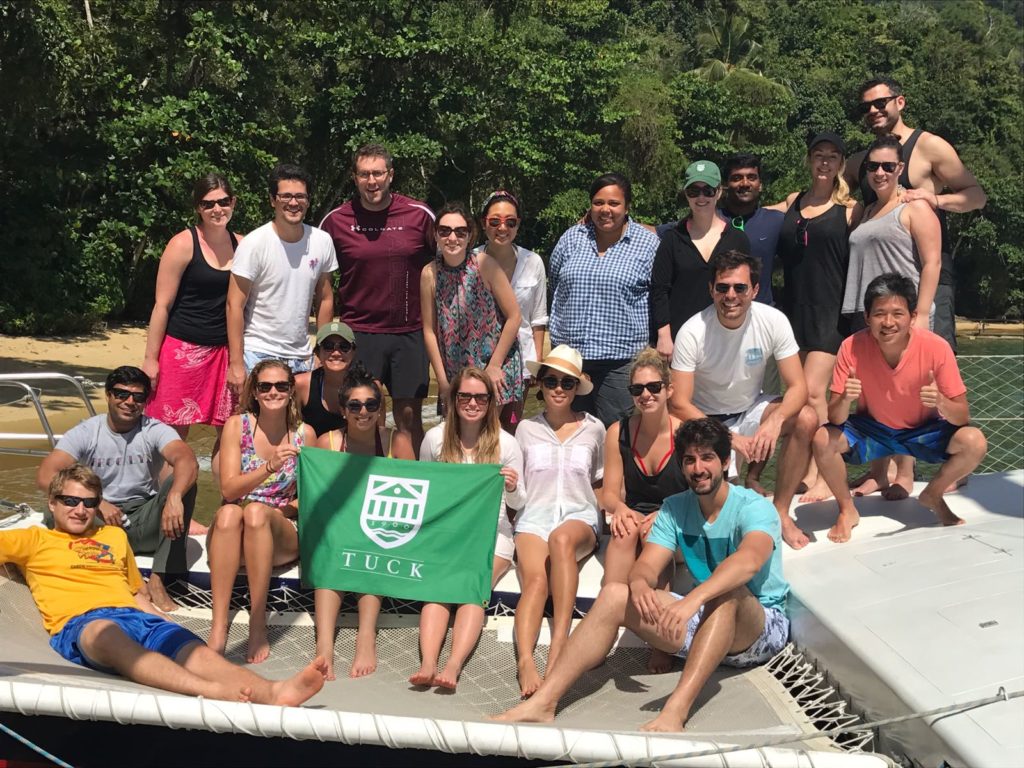As an admissions consulting firm specializing in international applicants, we know the many obstacles international students have to overcome in order to be accepted into a top-ranked business school.
One top-ranked school that’s increasingly on the list of numerous candidates is the Tuck School of Business. With its tight-knit community, powerhouse post-MBA job placement rates, and focus on students who are equal measures accomplished and nice, more and more applicants are looking to this Hanover, NH school.
That’s why we sat down with Tuck graduate Eduardo Watanabe to understand not only what his two years in Hanover were like but to also learn more about who his Tuck MBA set him up for future success.

(Eduardo Miki Watanabe, Graduate of the Tuck School of Business)
Eduardo Miki Watanabe is currently the head of analytics and artificial intelligence at QMC Telecom, a growth-stage company on the wireless infrastructure industry focused on Brazil, Mexico, and Colombia. Prior to that, Eduardo worked as a Chief of Staff of the co-CEOs, where he managed to revamp an entire business line to grow +200% a year. Eduardo started his career in Management Consulting for 5 years, when he left as a manager to enroll at Tuck. Eduardo holds a Bachelor of Mechanical Engineering from the Escola Politécnica da USP.
Ellin Lolis: How did you end up choosing to attend Tuck?
EW: I chose Tuck because I wanted to go to a top MBA school in the US in which I could make meaningful connections during my 2-year experience instead of just colleagues. With that in mind, Tuck became my first choice as it provides an immersive experience in which you really bond with your colleagues on a personal level, and I was not disappointed with my choice.
EL: How was your orientation process after arriving on campus?
EW: Tuck offers different types of pre-term programs, from an international orientation to international trips. I did a program named Outward Bound, and I highly recommend it.
It was a unique way to bond with my classmates, and many of those ended up being my best friends during and post-Tuck. This type of interaction eases a lot the adaptation to a new country and a new culture.
EL: What were your classes like?
EW: Most of my classes were case-based, very different from what I had in college in Brazil, therefore I had to adapt to prepare and be more vocal in class.
At Tuck, you’re also assigned to a study group that is purposely made to be diverse, and that was a great way to learn to be more empathetic and to learn from your classmates, all of whom have outstanding backgrounds.
EL: Did you get involved in any clubs? How did you decide what to get involved in? What was the process to obtain your summer internship like?
EW: Coming from a consulting background, I wanted to go on a more entrepreneurial path. Therefore, most of my recruiting effort was focused on off-campus recruiting.

(Photo courtesy of Eduardo Miki Watanabe)
And that was excellent to me since I could testify one of Tuck’s main qualities: our alumni network. I felt super welcomed by every alumnus I got in touch with. I ended up interning in the Bay Area at Tesla thanks to the alumni network.
EL: How did your summer internship go and how important was it in landing your full-time offer?
EW: My internship was amazing! I was living in one of the most inspiring places in the world, I had the autonomy to test and propose new ideas and really enjoyed Tesla’s culture.
My full-time recruiting was also off-campus and focused in Brazil, but the Tesla name was definitely important to open doors for networking.
EL: What was the best experience you had during your MBA?
EW: Organizing and executing a trip to Brazil. Differently from other fun treks, instead of hiring an agency firm, my 3 roommates and I organized on our own a very personalized trip to our classmates.

(Photo courtesy of Eduardo Miki Watanabe)
We wanted to do something special, and the 18 participants of the trek really provided wonderful feedback about it. We spent 2 days in Sao Paulo, 4 days in Rio and 2 days in Angra.
EL: What was it like to live in Hanover?
EW: Living in Hanover was one of the great surprises of my journey at Tuck. There was always something to do: the fall in New England is outstanding for hiking, and in the winter you are 45 minutes from Killington to go skiing. You’re also only 2 hours away from Boston and 5 from New York. It was a great setup to bond with classmates since we were always hosting dinner at our place and on Fridays, we had parties to enjoy.
EL: How did Tuck help you find your current job in Brazil?
EW: I got my job only because of Tuck. It was a classmate from Puerto Rico who introduced me to my bosses. We were hosting a dinner for TuckGives, an event that raises money to supplement salaries for Tuckies that go on internships in the nonprofit/public sector, when he offered to connect me with the co-CEOs of QMC.
EL: What has your experience as a Tuck alumnus in Brazil been like? Do you interact often with other Tuckies?
EW: It has been great! I am now a co-chair of the Tuck Alumni Chapter, thus I connect often with other alumni and I get along with them pretty well. And now we are embarking on a new project to improve the alumni network and take it to the next level.
EL: If you could re-do your MBA experience at Tuck, what one thing would you change?
EW: I’d take more risks in class. I feel I was too shy at class and didn’t vocalize enough my points of view in class. Had I done this I’d have learned much more than I did.
EL: Do you have any final advice you’d give prospective students?

(Tuck alumni gather for an on-campus event, Photo courtesy of @tuckschool on Instagram)
EW: When looking for an MBA, consider fit with the culture as one of the most important criteria. I’m sure that Tuck was the right choice for me, but also I’m completely aware that it may not be for everybody. Therefore, try to connect with as many alumni as possible to really get a sense of where you are going to spend your next couple of years.
EL: Thank you so much for your time, Eduardo. You’ve definitely helped us gain greater insights into the Tuck experience!
My team and I pride ourselves on being with you at every stage of the process as you apply to an elite program, giving you the confidence that you are taking the right steps toward your future with the information you need not only to get accepted into a top MBA but to find a program you love for life. That’s why I truly enjoyed talking with Eduardo Watanabe and bringing this information to you.
If you need help planning how to navigate the first weeks of your MBA, designing an application strategy, or even if you’re just starting the application process and aren’t sure exactly what to do next, my team and I can help! Schedule your free consultation with us today.
Real MBA Essays That Got People In
School-specific sample essays that got our clients accepted






